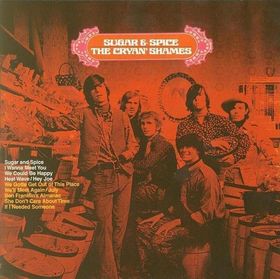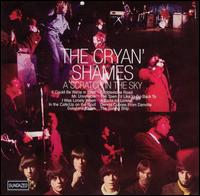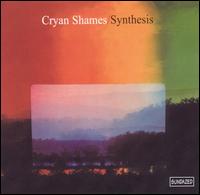The Cryan' Shames
Albums Reviewed on this page: Sugar
and Spice, A Scratch in the Sky,
Synthesis.
The Cryan' Shames were a Chicago pop-rock
band who
could play pretty well, but did not do anything new. They
released a whopping three albums, of which I have two. The
first is an exercise in trend copying, while the second is a nice
little psychedelic pop-rock album. Not a classic mind you,
just
a nice little album. The main force in the band was lead
guitarist Jim Fairs: he and bassist Lenny Kerley wrote most of A
Scratch in the Sky. However, Fairs left during
their third
album (I believe), and I am unsure about the results. I am
disinclined to
type up all the members of the band again. If you
are
insanely curious, look at the end of the reviews.
 Sugar
and Spice (1966), **
Sugar
and Spice (1966), **
Boy,
somebody likes the Byrds.
The Cryan' Shames sound like the local Byrds
cover band, which makes sense for mid-1966. They don't do
anything silly like play the hits, but "We'll Meet Again"
and "She Don't Care About Time" are played outright, and
the band's entire approach is Byrdsian: guitarist Jim Fairs does a
good McGuinn impersonation on 12-string, and the group has their
harmonies down, but why listen to this when can listen to the
original? To be fair, Sugar and Spice is
not all
Byrdsian; the band covers other top acts - Beatles ("If I Needed
Someone"), Motown ("Heatwave"), the Leaves ("Hey
Joe"), and the Animals (an odd version "We Got to Get Out
of This Place" with an unfunny spoken intro, and possibly
overdubbed crowd noises). Even the fun, bouncy title track
was
a Searchers hit from 1963. There are some good
signs here
- the band plays well together (as expected from a cover band), and
lead guitarist Jim Fairs penned four tracks. At best, his
work
is average pop-rock ("I Wanna Meet You", "We Could Be
Happy"), but "Ben Franklin's Almanac" is a small step
beyond their Byrds copying. It's still quite Byrdsian, but
more
rocking, as the rhythm guitar plugs away at a Bo Diddly beat, and
Fairs allots himself a nice solo spot. He is, well, at least
fair, at lead guitar, although nobody else in the band really stands
out. Again, they were probably fun to see live, but only a
substitute for what was readily available. Nothing
particularly
original about Sugar and Spice, unless you include
the guy
with a hook (Jim Pilster aka J.C. Hooke) for an hand playing
tambourine. Although that may be enough for some. The rest of
the band is Dennis Conroy (drums), Tom Doody (lead vocals), Dave
Purple (bass), and Gerry Stone (guitar).
 A
Scratch in the Sky (1967), ***
A
Scratch in the Sky (1967), ***
Just
like scientists posturing the existence of an unknown particle or
detecting a planet through its gravitational pull, you knew this had
to exist - a Chicago psychedelic pop-rock album. Okay, maybe
you did not know it, but it does exist and if you
can accept
the fact that the Cryan' Shames never had an original idea in their
entire lives, you'll enjoy A Scratch in the Sky.
The
album succeeds because Fairs and new bassist Lenny Kerley did a great
job writing hooks, coming up with catchy melodies, and getting the
group's vocal harmonies into shape. Instead of the Byrds,
the Chicagoans now echoed West Coast harmony groups like the Beach
Boys and the Association, as well as British psychedelia. So,
the group gathered up every conceivable instrument they could play,
and went on a psychedelic pop-rock binge. A
Scratch in the Sky is not a
masterpiece, but it was more cutting edge than Paul Revere and the Raiders
ever got. The band's flexibility is apparent, from happy
little
tunes like "The Town I'd Like to Go Back To" and the
cosmopolitan "In the Cafe," to more Beach Boys
influenced songs like "It Could Be We're In Love."
The group had enough chops to successfully venture into more rock
territory ("Sunshine Psalm" and the humorous "Dennis
Dupree from Danville") and their psychedelic jams are rather,
erm, pretty (the intricate "The Town I'd Like to
Go Back
To"). Fairs and Kerley just cranked out a pile of fine pop
songs such as "A Carol for Lorelei", "In the Cafe",
"Cobblestone Road" and the tripped out "The Sailing
Ship," among those already mentioned, and the
band's playing is credible and detailed enough to enable the
Fairs/Kerley songwriting team to present all this without it coming
off as crude. Sure, there is plenty
of outright
copying: "Mr. Unreliable" is a fine Beatles knockoff and "I
Was Lonely When" is a dead-on impression of a Marty Balin led
Jefferson Airplane
track, and there's an
unnecessary cover of the Goffin/King "Up on the Roof". Still, if you
like psychedelic pop-rock (or think you might) check
this out - it's rather good, even if unoriginal. (Isaac Guillory
(guitar) replaced Stone as well.)
 Synthesis
(1968), **
Synthesis
(1968), **
This
pegs the group's interest as drawing from both American West Coast pop
groups like the Mamas and Papas, as well as stars like the Beatles, to
make relatively adventurous pop-rock. Synthesis follows
Scratch's
technique of featuring songs in a variety of styles, but suffers from
the loss of Fairs. He contributed one of Synthesis's
two standout tracks: "First Train to California", a nice sunshine pop
song drawing from squeaky clean acts like Mamas and Papas and
the
Beach Boys. The other is "Greenberg, Glickstein, David Smith
and
Jones", a full blown psychedelic rock song, with instruments turned up,
phased production, and everything. While I give them marks
for
trying, Guillory may have discovered drugs, because his two pop epics
("A Master's Fall" and "Symphony of the Wind") close out both sides of
the album. They sound like the band was emulating the Moody
Blues' grandiose approach, but the melodies and lyrics flop.
The
chorus of his regular psych-pop song "The Painter" is also close to a
parody: "I'm the funny painter man (he's the funny painter man)."
A couple of pop songs are decent enough ("Baltimore Oriole"
and
"Sweet Girl of Mine"), but the rest of the album is pretty flat
(curdling ballads, a Caribbean rhythm tune, etc). While they
did
not have horns tacked onto every track and avoided Paul Revere's mimeographed pop stylings, Synthesis is a disappointing
final entry from the group.
Fairs
appeared on a Pearls Before
Swine album in 1969 (recorded in NY?), and Guillory released a solo
album in the 1970s, which,
embarrassingly enough, I own.
 Sugar
and Spice (1966), **
Sugar
and Spice (1966), ** A
Scratch in the Sky (1967), ***
A
Scratch in the Sky (1967), *** Synthesis
(1968),
Synthesis
(1968),